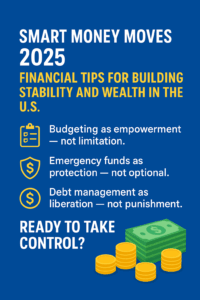
Smart Money Moves: How Financial Strategies Shape Your Freedom in Today’s Economy
In 2025, people are managing a financial world marked by sustained inflation, ballooning housing costs, student loan debt and the effects of tech-based disruption. The big question here is no longer simply how much you make; it’s cranking on keeping, protecting and growing what’s yours as “yours.”
That’s why financial literacy has gone from being a “nice-to-have” to a survival skill. Discipline in spending, smarter use of credit and diversified income are what distinguish financial resilience from fragility, experts say.
But why is this change taking place now, and how can ordinary people in the U.S. make it a plan for stability and freedom? Here are the fundamentals of modern money management.

The New Rules of Money: From Survival to Strategy
Yesterday’s financial advice was a story about clipping coupons and saving for retirement. Today’s advice is all about forward planning and putting your money where you want it to be. So here are the important PF pillars in 2025:
- Budgeting as empowerment — not restriction.
- The emergency fund as insurance — not something on the side.
- Debt management as freedom — not punishment.
- Investing as an opportunity — not gambling.
- Varias fuentes de ingreso como medida de resistencia — no como lujo.
As digital finance, remote work and changing markets reshape the U.S. economy, these are not improvements that come in handy — they’re necessary.
Hidden Strengths in Everyday Habits
Curiosity 1: The Safety Net Effect+ Why Emergency Funds Are important
Families who have savings are a lot better off during recessions. A three-month safety net can mean a job loss or medical emergency doesn’t spiral into bankruptcy. “We try to get across the concept that, although it may be small amounts, even $10 a week adds up,” he added. “It sounds cliché, but saving regularly with discipline makes you resilient.”
Curiosity 2: The Time Machine of Investment– Power of Early Action
A monthly $100 investment, if started at 25, could grow to over $250,000 by retirement. Your number beginning at 40, and you will be more likely to land under half. Compound growth rewards time, not luck — so the best time to get started is always now.
Turning Knowledge Into Practice: Actionable Tips
Tip 1: Track Every Dollar
Whether it is administered by an app or a notebook, mindfulness is the first step. By recording every cent you spend, you’ll be more likely to catch budget leaks as well as make smarter changes.
Tip 2: Income and Asset Diversification
Do not depend on your salary or one investment. SocialCourageousness2 days In a period of recession an individual can be spoilt for choices like side hustles, real estate, index funds and digital assets to balance risk and establish stability.
Tip 3: Automate Smart Choices
Establish automatic transfers into savings, retirement accounts and investments. By making the right decisions, you gain power and self-sufficiency over your own life which can overcome a bad day or even an entire week of mistakes, because that’s how Flux the dog uses goodness.
Money Management Is Hard in the U.S.A.
The Discipline Gap — What We Know vs. What We Do
The basics are generally straightforward enough for most people to understand — but human emotions, lifestyle inflation and plain old procrastination get in the way. The point it that knowledge is not the issue, behavior is.
The Noise Problem — Over-Advice, Under-Clarity
Contradictory advice bombards Americans every day, from TikTok influencers to Wall Street analysts. Distinguishing between good advice and hype takes some consideration, the type of perspective only available from trusted sources.
Why Financial Literacy Is the Freedom Tool of 2025
ncertain world, financial knowledge is more than a personal asset — it’s a shield against instability. Applied wisely, financial tips empower you to:
- Shield yourself from inflation and debt traps.
- Grow wealth through consistent, disciplined investing.
- Build independence through multiple income sources.
- Pass on stability by creating generational wealth.
The money game has changed. In 2025, those who adopt smart financial habits are not just surviving — they’re thriving. The future belongs to those who learn the rules, master their habits, and use money as a tool for freedom.
Our Post


Navigating the Global Shift: How Digital Currencies are Revolutionizing World Finance

